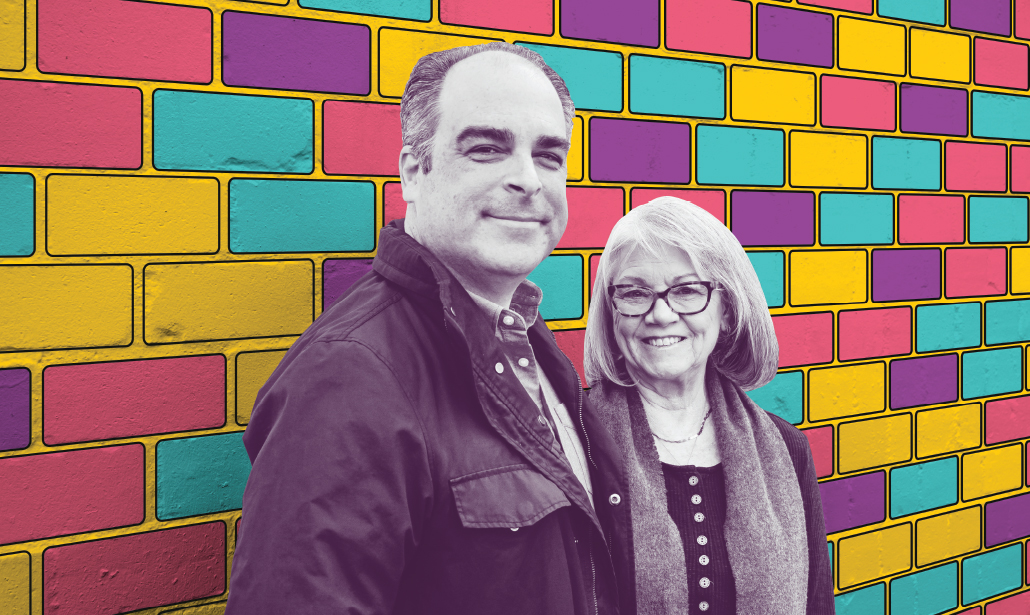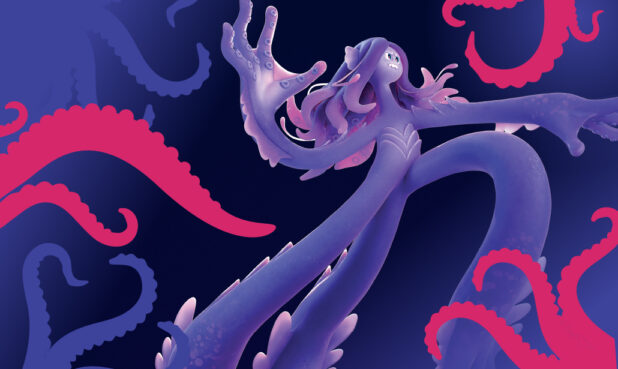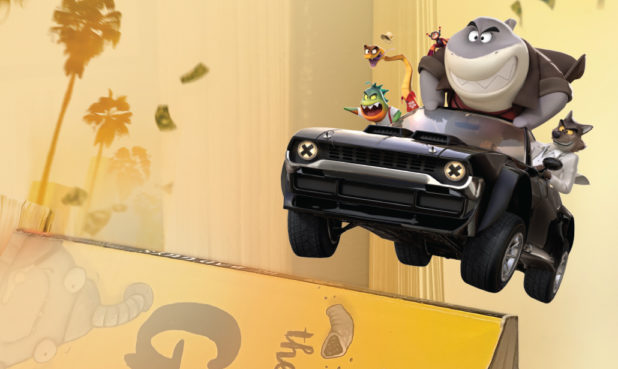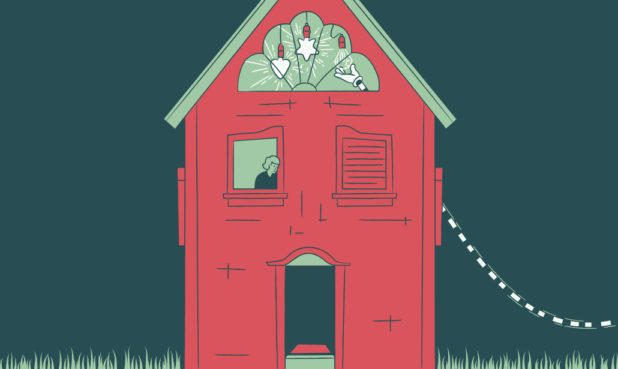Jill Stirdivant & David Rodriguez
When David Rodriguez started at Disney Television Animation as a clerk in 1994, he was told that if he stuck with the office job for a year, “they would consider what I could do as an artist.” During those 12 months he became aware of color styling (now called color design). He told management he was interested. They sent him to Color Stylist Jill Stirdivant.
“It never really occurred to me to teach someone what I knew until the idea was brought up to me,” Stirdivant says. “We just hit it off instantly. And I knew at that moment when I first met David that I was going to do this. It was my way to pay it forward. To take my knowledge and my skills and hand it off to him.”
Now retired, Stirdivant started at Disney features in the 1980s as a painter on The Fox and the Hound, learning from “the very best women in Ink and Paint,” she says. “There was a process to produce these high-quality productions. It translated a little differently at TV … but there were still the key components.”
“It was at the tail end of Ink and Paint, so she taught me using cels and paint,” Rodriguez says. “I was like a kid in a candy store.”
Stirdivant also taught Rodriguez to use the computer painting program and a Wacom tablet and pen, which were just coming into use in the mid-1990s, and he points out that she did all of this on her own time, without pay, for about six months.
Then, along with Director/Producer Karl Geurs, she pushed to get him hired as a color stylist on Pooh’s Grand Adventure. “I was the first guy color stylist at Walt Disney TV Animation,” he says.
One of the reasons they both feel their mentor-mentee relationship worked was because Rodriguez wanted to put in the effort. He values what he’s learned from her so much that “I want to pass it on to somebody who wants to learn—not just wants a higher paycheck. I want to pass on how to do it correctly. You have to know the story. You have to talk to your director. You don’t just start throwing color down.”
Over the years they have worked together on numerous projects, and Rodriguez—who is currently Lead Color Designer on Alice’s Wonderland Bakery—makes it clear that he credits Stirdivant for his career. “I don’t think you can learn having a color sense, but I think I had a color sense that she brought out of me,” he says. “She was honest and fair and knowledgeable. She’s the one person I still trust in my career when I need help or advice.”
Stirdivant, in turn, says Rodriguez taught her to always keep her sense of humor. “I wasn’t engaging enough in that prior to my relationship starting with David. He also gave me an appreciation of what I knew. Realizing the valuable lessons I was taught came from mentoring David.”
Joe Purdy & Ariel Ladensohn
Back in 2015, Ariel Ladensohn learned that her playwriting teacher’s former student, Joe Purdy, was story editing on Ready Jet Go in the building where she worked. She asked if it would be all right to pop in and introduce herself. Getting the okay, she knocked on Purdy’s office door and walked right into the middle of a meeting.
Rather than dismiss her, Purdy joined her for coffee later. Their mutual connection was enough to start a conversation. It kept flowing because “we hit it off,” Ladensohn says. “Joe is absolutely the nicest guy.”
But later, giving Ladensohn her break writing on Llama Llama where Purdy was Co-Executive Producing, wasn’t just about being nice. Yes, he says, it was a fast friendship, but it was also “an immediate creative respect. I read Ariel’s stuff and I thought, my God, this is so fun, funny, interesting.”
As for mentorship, it came naturally. “Joe very much leads by example,” says Ladensohn, who is now a writer on the Futurama reboot. “He’s not someone who gives you unsolicited advice constantly.”
Purdy does more than this, though, according to Ladensohn. He also, always, picks up her calls. “He’d been there before and understood what it was like in the positions I was in,” she says. “He would help me deal with whatever I was going through.”
It was also a bonus to Ladensohn that she grew up addicted to ‘90s series like Hey Arnold!—shows where Purdy had played a seminal role. Mindful of the influences that propelled this career that Ladensohn admired, Purdy feels: “We’re in the trenches, we’re doing this together, so we’re partners. Guide by experience, and always be nimble and learning on every project.”
After giving Ladensohn her first shot, Purdy helped her get other jobs, and they developed a project they eventually sold to Freeform. Starting out as kids’ show, it evolved into what they laughingly call animated adult horror comedy. Purdy was still supervising Ladensohn, but now they were also partners, and she says, “It was the most fun experience I’ve had thus far doing anything.”
“Joe knows what it’s like to build an animated show from the ground up. What do you need in character design? Making sure the script is going to work when it hits the screen,” she says. “He’s [also] super professional but can have fun with it. I think it’s really easy to take things too seriously, and with Joe there’s a good balance.”
The two have become so close that their families are friends, and now that they’re on equal footing in many ways, it would seem that the mentorship would fade away. Not so. “We’ve been getting coffee through every iteration of my career,” says Ladensohn. “Joe’s been a sounding board, helping me stay the course in tougher times, as well. He is still the person I turn to for advice.”
Though his is the teaching role, Purdy is fast to point out what he has gained. “Ariel is a true scholar. She’s a quick study and also fun, but she does a deep dive on subjects,” he says. “I always respect that there is this wide and deep conversation about things. She’s ridiculously loyal and a hard worker and really is appreciative of what she learns.”
Now freelancing and in development on a few shows, Purdy credits the organic nature of their relationship for its multi-layered success: “It wasn’t set up. It wasn’t forced.” It felt natural for him to guide her the way colleagues and friends had helped him along the way. “The creative kitchen was always open,” he says. “I think it’s fun to just keep inviting more people in.”
Angela Entzminger & Jacqueleen Muñoz
Some people are born to be leaders. Angela Entzminger is one of them.
She was working at Nickelodeon in 2020 when she learned about Rise Up Animation and its mentorship program. She remembered how hard it was to get her first full-time job. “My friends and I [were] grasping in the dark trying to figure out how to do anything. I didn’t want anyone else to have to deal with this,” she says. So she set out to demystify the process.

Rise Up paired Entzminger, who is currently a writer on Warner Bros.’ My Adventures with Superman, with Jacqueleen Muñoz, and Entzminger says: “Right away I was super impressed with her artwork. Her boards are really great.”
This enthusiasm was exactly what Muñoz needed. She had graduated from ArtCenter College of Design into the pandemic lockdown. “There was nothing,” she says. “No internships, no trainee programs. [Rise Up] was a port in a storm. To have someone in the industry in my corner. Not just helping me with my work, but also helping me keep my chin up.”
Entzminger takes a strategic approach to mentoring, first sending out a questionnaire. She asks who her mentee’s favorite artists are, what age group they want to work with, if they want to work in TV or film, and other specific questions. “Not only does that help me know where they’re coming from,” she says, it helps them start to think about what they want to do.
By the time she meets her mentee, Entzminger can say, “Okay, based on what you want to do and your skill set, here are my recommendations to get you to this point.” She focuses on everything from craft to cover letters because “I’m trying to get them focused on the long haul.”
“Angela taught me that I’m not by myself in some void just begging to get to the other side. There are people who want to help bring me over the gap.”—Jacqueleen Muñoz
While Muñoz values the industry insider expertise Entzminger brings to the table, “with what I should be doing to get a specific job with a specific show and that kind of thing,” she says, “I think what meant the most to me was that, right off the bat, it was a lot of warmth and support in a time where I really didn’t feel like there was much going for me.”
A more formal program also means resources. In Rise Up, for example, there is a Slack channel for the mentors where people can ask questions, post resources, and talk about best practices. For mentees there’s a Discord channel to connect and share experiences, which is helpful because there is an art to being a good mentee.
“Start thinking about, what really compels you?” Muñoz advises. “What made you want to get into animation?” Having answers to these questions makes it easier for your mentor to guide you in a direction you want to go.
Despite the more formal nature of the Rise Up program, both Entzminger and Muñoz have benefited in personal ways.
“Jacqueleen has definitely rekindled my love for animation,” Entzminger says. “It’s not that the love went away, but there are days that are hard, a lot of work. Talking with her, she reminded me, this is a very joyful thing, the art of creation.”
Muñoz, who credits her current (and first) industry job as a Storyboard Revisionist on The Loud House to Entzminger, says: “Angela taught me that I’m not by myself in some void just begging to get to the other side. There are people who want to help bring me over the gap. Having this absolute angel of a woman show me again and again that’s she’s there for me meant everything.”





